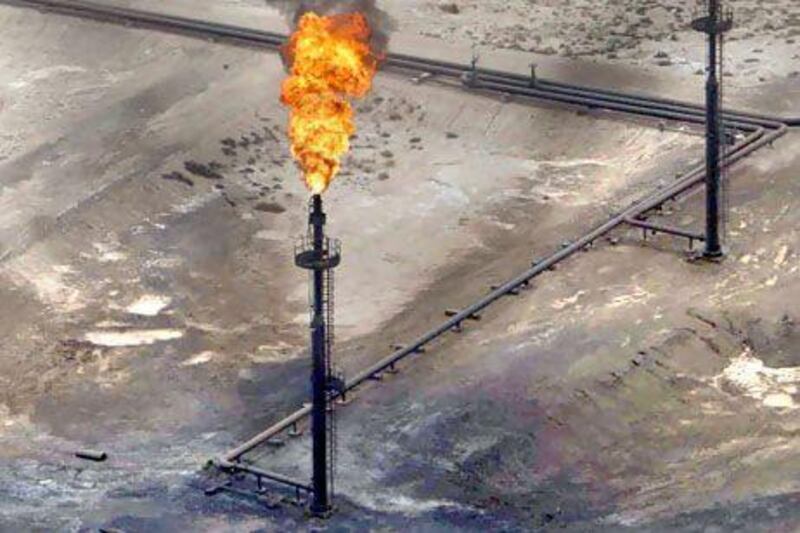Nearly a decade ago, Iraq was in flames as the United States staged its second invasion of the country.
The war not only toppled Saddam Hussein, it also led to a gradual rebirth of the country's oil and gas sector, which was crippled by conflict and sanctions.
Now, after years of rebuilding its energy infrastructure, the Opec member is emerging at the heart of a changing global oil market.
No other oil producer will grow its output as emphatically as Iraq. The International Energy Agency (IEA) forecasts that production will grow from about 3 million barrels per day (bpd) to more than 8 million bpd by 2035. Not even the US, which the IEA predicts will outproduce Saudi Arabia within five years, will match Iraq's growth over the long term.
Iraq's resurgence as a major player in the oil markets is likely to cause friction among Opec members as the body will have to accommodate the country's increasing exports into its production ceiling.
But internal Opec tension will be mitigated by calls for more production as the demand for oil will be fuelled by Asia's growing hunger for energy.
China's economic growth, in particular, means that global consumption will increase from the current 90 million bpd to almost 100 million bpd in 2035, despite falling demand in the West, says the IEA.
New extraction techniques will allow access to oil and gas previously trapped in rock formations in North America, allowing the US to become energy independent.
The oil gushing from Iraq's wells will increasingly flow east.
"Where the US is a game changer in unconventional oil and gas, Iraq is a game changer in conventional oil and gas," says Maria van der Hoeven, the IEA's executive director.
"In the future, the overwhelming amount of [Iraqi] oil will go to Asia."
The paradigm shift is already becoming evident in Iraq's dealings with international oil companies.
Unhappy with the terms offered to them under contracts signed with Baghdad, western oil companies have become increasingly restive.
Late last year, ExxonMobil became the first to act on its misgivings by setting up shop in the autonomous region of Kurdistan. Its deal with the Kurdish regional government to explore six blocks in the region set it on a collision course with the central government, which refuses to recognise energy contracts signed with the Kurds.
Baghdad repeatedly warned Exxon that its Kurdish venture endangered its rights to produce in the south, where the US company has a share in operating the West Qurna-1 supermajor oilfield. But the government's attempts to force the company's hand backfired when Exxon announced this month that it wanted to end production there.
Baghdad is now short of one heavyweight player with the muscle to exploit one of its southern supermajor fields and is looking east to make up the shortfall.
According to inside sources, the government has approached China National Petroleum Company (CNPC) and Russia's Lukoil in an effort to sign them up as Exxon's replacements in the US$50bn (Dh183.65bn) project.
"During two separate meetings with executives from CNPC and Lukoil, Iraq informed the companies that it favours their contribution to purchase Exxon's share in West Qurna-1 oilfield," one official told Reuters.
The news agency also reported that the central government had received "positive signals" from both companies. Two sources from CNPC said that the state-owned company was interested in expanding its operations in Iraq and was not interested in jeopardising its existing projects in the south for deals in Kurdistan.
Western majors such as France's Total and the American firm Chevron have followed Exxon's lead and entered agreements to explore in Kurdistan, so far without retaliation from Baghdad.
Under pressure to create value for its shareholders, western companies remain unconvinced by the Iraq oil game.
"There is fierce competition internally for [capital expenditure], so that is why we withdrew from West Qurna. When you looked at the risks and the return, it couldn't compete," said Anders Hatteland, the senior vice president for development and production for Norway's Statoil in the Middle East.
Statoil this year sold its stake in the West Qurna-2 field to Lukoil, which is keen to compensate for its declining domestic production with assets abroad.
For CNPC, the profitability of its operations in Iraq is of only secondary importance. What matters is volume, and the company is unlikely to risk access to the vast reserves in Iraq's south for more lucrative, but less plentiful, Kurdish oil.
A pattern in China's scramble for natural resources is evident in Iraq. After pumping billions of dollars into Africa in return for access to its crude, the Middle East is now on China's energy security map.
"We've seen it in the past," says Ms van der Hoeven. "Chinese investment money will go into the region, and oil will flow back to Beijing."
And what better way to secure future supply than by tapping the most promising source of new oil?





